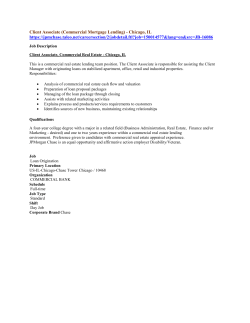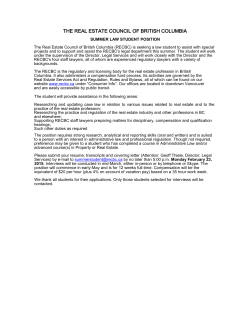
Office of the Nassau County Public Administrator: Selected Financial
New York State Office of the State Comptroller Thomas P. DiNapoli Division of State Government Accountability Selected Financial Management and Administrative Practices Office of the Nassau County Public Administrator Report 2013-S-37 April 2015 2013-S-37 Executive Summary Purpose To determine whether the Office of the Nassau County Public Administrator (NCPA) operates in compliance with governing statutes and guidelines. Our audit covers the period January 1, 2010 to February 28, 2014. Background The New York State Surrogate’s Court Procedure Act establishes a Court-appointed Public Administrator in 11 counties in the State, including Nassau County. Public Administrators are responsible for administering the estates of individuals who die intestate (without a will) and leave either no known heirs or heirs who are not qualified or willing to administer the estate. They are responsible for collecting, securing, and liquidating each assumed estate’s assets in order to pay valid claims against that estate. After all reasonable expenses have been paid, the Public Administrator is responsible for distributing any residual value to estate beneficiaries. Any unclaimed funds are remitted to New York State after the statutory time period. Each Public Administrator maintains a suspense account to pay estate-related expenses not covered by the Public Administrator’s appropriated county budget and prior to liquidating estate assets. The suspense accounts are funded by a fee set by the Surrogate’s Court on the closing value of each administered estate. As of December 31, 2013, the NCPA reported a caseload of 168 open estates with an estimated gross value in excess of $44 million. Key Findings •The NCPA did not have documentation to support the hiring and compensation of employees who are paid through the suspense account, as otherwise required by governing regulations and guidelines. •The average monthly balance in the NCPA’s suspense account dropped from $241,214 in 2010, to $74,442 in 2013 ‒ a decrease of $166,772 (69 percent). •Although the NCPA publicly advertised for vendors annually, it did not prepare the required list of preferred vendors until 2013. Additionally, several vendors did not complete the required “Application to Provide Services.” The NCPA also did not maintain written documentation justifying the selection of particular vendors as required by the governing Guidelines. Thus, it was not clear the NCPA used the most qualified vendors at the best available prices. •Certain estate assets were put up for sale without the documented formal prior approval of the Surrogate’s Court pursuant to statute. •The NCPA’s Annual Reports to the State Comptroller did not list non-cash estate assets as required by statute. Thus, the values of many estates were significantly underreported. Key Recommendations •Document the justification for the hiring of, and related payments to, employees financed by the NCPA suspense account. •Determine ways to minimize expenses associated with the suspense account. •Update the outside vendor list annually, justify the placement of each vendor on the list, and do not use vendors that have not properly applied. Division of State Government Accountability 1 2013-S-37 •Prepare each Annual Report to the State Comptroller in compliance with the Regulation. Other Related Audit/Report of Interest Niagara County Public Administrator: Internal Controls Over Estate Assets (2009M-238) Division of State Government Accountability 2 2013-S-37 State of New York Office of the State Comptroller Division of State Government Accountability April 28, 2015 Mr. Jeffrey DeLuca Public Administrator Office of the Nassau County Public Administrator 240 Old Country Road Mineola, NY 11501 Dear Mr. DeLuca: The Office of the State Comptroller is committed to providing accountability for tax dollars spent to support government-funded services and operations. The Comptroller oversees the fiscal affairs of State agencies, public authorities, and local government agencies, as well as their compliance with relevant statutes and their observance of good business practices. This fiscal oversight is accomplished, in part, through our audits, which identify opportunities for improving operations. Audits can also identify strategies for reducing costs and strengthening controls that are intended to safeguard assets. Following is a report of our audit of the Office of the Nassau County Public Administrator entitled Selected Financial Management and Administrative Practices. This audit was performed pursuant to the State Comptroller’s authority as set forth in Article V, Section 1 of the State Constitution and Article 3 of the General Municipal Law. This audit’s results and recommendations are resources for you to use in effectively managing your operations and in meeting the expectations of taxpayers. If you have any questions about this draft report, please feel free to contact us. Respectfully submitted, Office of the State Comptroller Division of State Government Accountability Division of State Government Accountability 3 2013-S-37 Table of Contents Background 5 Audit Findings and Recommendations 6 Financial Management Practices 6 Estate Administration 8 Recommendations 10 Audit Scope and Methodology 11 Authority 11 Reporting Requirements 12 Contributors to This Report 13 Agency Comments 14 State Comptroller’s Comments 19 State Government Accountability Contact Information: Audit Director: Frank Patone Phone: (212) 417-5200 Email: StateGovernmentAccountability@osc.state.ny.us Address: Office of the State Comptroller Division of State Government Accountability 110 State Street, 11th Floor Albany, NY 12236 This report is also available on our website at: www.osc.state.ny.us Division of State Government Accountability 4 2013-S-37 Background The New York State Surrogate’s Court Procedure Act (Act) establishes a Court-appointed Public Administrator in 11 counties in the State, including Nassau County. The Public Administrator is responsible for administering the estates of individuals who die intestate (without a will) and leave either no known heirs or heirs who are not qualified or willing to administer the estate. The Office of the Nassau County Public Administrator (NCPA) is the subject of this audit. Under the authority granted by the Surrogate’s Court, the NCPA collects, secures, and liquidates estate assets in order to pay valid claims against the assumed estates, such as those for the decedent’s funeral and taxes. After all reasonable expenses have been paid, the NCPA is responsible for distributing any residual value to estate beneficiaries. As of December 31, 2013, the NCPA reported a caseload of 168 open estates with an estimated gross value in excess of $44 million. The NCPA is required to file an Annual Report with the Office of the State Comptroller that lists, among other items, the gross value of each estate. The purpose of these reports is to document the expeditious handling of the estates. Undistributed estate assets are remitted to the State as unclaimed funds after the statutory time period. Pursuant to the authority granted by the Act, the Administrative Board for the Offices of the Public Administrators has prepared “Guidelines for the Operations of the Offices of the Public Administrators of New York State” (Guidelines). According to Section I.D.1 and I.D.2 of the Guidelines, each Public Administrator may maintain a suspense account to make estate-related payments not funded by the Public Administrator’s appropriated county budget and prior to liquidating estate assets. The suspense accounts are then reimbursed upon asset liquidation. The suspense accounts are funded by a fee (commission) set by the Surrogate’s Court on the value of each estate upon closing. The Guidelines also state that the Public Administrator shall be guided by established principles of fiduciary accountability, statutory authority, and/or direction by the court. Division of State Government Accountability 5 2013-S-37 Audit Findings and Recommendations We determined that the Office of the Nassau County Public Administrator needs to improve its administration of estates to ensure compliance with governing statutes and guidelines. In addition, we determined that its internal controls over certain financial management functions were inadequate. Financial Management Practices Suspense Account Employees The NCPA’s annual budget financed by Nassau County covers the salaries of seven employees, including the Public Administrator and the Deputy Public Administrator, and office-related expenses. In addition, the NCPA employs two full-time workers, an office manager and an estate administrator, and until 2012 one part-time accounting clerk, whose salaries and benefits are paid through the suspense account. According to the Guidelines, the NCPA may use the suspense account to pay the salaries and benefits of office personnel provided that the office maintains records justifying the hiring of these employees as well as their respective salaries and benefits. However, the NCPA does not maintain such records. In addition, the NCPA does not maintain personnel files for these suspense account employees setting forth their duties and responsibilities. The only personnel-related documents we received for these employees was a May 2013 job description questionnaire that was completed for Nassau County – approximately two years after their employment began. The Public Administrator advised us that he used his personal judgment in the hiring of the suspense account employees based on an increased office workload. However, he did not provide us with the required records to support the hiring. The three suspense account employees filled the following positions: •Office manager: full-time position, created in April 2011, with a pay rate of $35 per hour. •Estate administrator: full-time position, created in September 2011, with a pay rate of $20 per hour. •Accounting clerk: part-time position, created in January 2011 until February 2012, with a pay rate of $20 per hour. From February 2011 through July 2013, these employees were paid a total of $358,103 in wages and benefits from the suspense account. We noted that these suspense account employees received pay raises and other benefits during this time period without documented justification. For example, the office manager received two hourly pay rate increases that brought her pay rate from $35 to $42 per hour during her first year of employment. The estate administrator also had a pay increase from $20 to $23 per hour during her first year of employment. These pay increases resulted in an additional $38,157 in costs to the suspense account from September Division of State Government Accountability 6 2013-S-37 2011 to October 2013. Pursuant to Section 162 of the State Labor Law, an employee who works a shift of more than six consecutive hours is entitled to at least a 30-minute meal break. The NCPA’s Nassau County employees, including the Public Administrator and Deputy Public Administrator, are not paid for their lunch breaks. However, suspense account employees are paid for every hour in attendance whether or not they break for lunch. When asked, the office manager told us that the suspense account employees work through their lunch period (30 minutes) because they need to be available to perform their daily job functions. We note that the suspense account employees do not have job duties that would require them to be in the office for their entire shifts. The additional cost to the suspense account totaled $17,832 over the three-year audit period. We also note that Nassau County employees receive health insurance benefits after completing six months of government service. However, the NCPA’s suspense account employees were not required to wait that long. We found that the NCPA provided health insurance coverage for the office manager just four months after she was hired; the estate administrator received health insurance benefits after only one month of employment. These benefits cost the suspense account $6,846 during the first six months of employment. When questioned, the Public Administrator advised us that employees paid through the suspense account were not subject to Nassau County regulations, and that he determined they should receive health insurance benefits without the full waiting period. Suspense Account Balance Given the irregular nature of the funding sources for the suspense account, it is reasonable to expect that the balance in the account will fluctuate, as estate disbursements are made and assets and commissions are collected. However, over the scope of our audit, the average monthly balance in the suspense account steadily declined. The chart below shows the average monthly suspense account balance from 2010 to 2014. Suspense Account Balance 2010-14 Account Balance $400,000 $300,000 $200,000 Suspense Account Balance $100,000 $0 0 12 24 Division of State Government Accountability 36 48 60 7 2013-S-37 A review of expenses shows that in 2010, for every $1 earned in commissions, $0.58 was spent on office expenses. However, from 2011 through 2013, for every $1 earned in commissions, an average of $1.50 was spent on office expenses. The primary reason for the increase in office expenses was the salary and benefits paid to the suspense account employees (office manager, estate administrator) mentioned earlier in the report. At the current rate of disbursements, there is a possibility that the suspense account may become insolvent. If that were to occur, there would be no funds available for estate disbursements. With respect to the suspense account becoming insolvent, the Public Administrator told us that he has the ability to request that the Surrogate increase the commission fee from 1 percent to 1.5 percent. Use of Outside Vendors According to the Guidelines, the Public Administrator may employ outside vendors (e.g., appraisers, contractors) to perform services that are necessary to properly administer estates. From 2010 through 2013, the NCPA paid 52 vendors a total of $1.7 million to provide such services. To help ensure an open competitive vendor selection process, and to promote the hiring of qualified vendors, the Guidelines require Public Administrators to publicly advertise. The NCPA also established an internal policy to request that all interested vendors complete an “Application to Provide Services.” The application asks vendors to denote the type of services offered, their previous experience, applicable license numbers, insurance coverage, and requested compensation (e.g., fees, billing rates). The Guidelines also require the Public Administrator to create an annual list of outside (preferred) vendors based on these applications, the vendors’ respective reputations, and the Public Administrator’s past experiences with them. However, although the NCPA publicly advertised for vendors, we were informed that they did not maintain their annual lists of preferred vendors until 2013. Thus, we cannot be assured the lists were in fact prepared. We also found that 10 of the 52 vendors used during the audit period, who received $434,931 in payments, did not have a vendor application on file, nor were they on the 2013 list. Further, the NCPA did not maintain written documentation justifying the selection of these particular vendors as required by the Guidelines. Thus, it is not clear that the NCPA used the most qualified vendors at the best available prices. When we discussed this matter with NCPA officials, they agreed to update the list annually as required. Estate Administration After the NCPA is notified of an intestate death in Nassau County, it conducts an initial search of the decedent’s residence. During that initial search, the NCPA also reaches out to neighboring residents to obtain additional information regarding the decedent, his or her family, and the estate. When available, to protect the integrity of estate assets, an independent witness, such as Division of State Government Accountability 8 2013-S-37 a building superintendent, landlord, or police officer, is present at the initial search. Recording and Reporting Estate Assets According to the Guidelines, the Public Administrator must maintain an electronic casemanagement system containing a record of each estate under administration. The system should provide an inventory of each item of real and personal property of saleable value in each estate and the location of such assets. The NCPA’s electronic inventory records consist of individual inventory sheets that provide detailed information on the assets of each estate and their disposition; these are updated continuously. In addition, the NCPA utilizes a manual inventory record-keeping system to document estate assets stored in its safe room. We determined that the safe room inventory is not sufficient because it does not contain relevant information, such as the date an asset was disposed. As a result, NCPA staff cannot fully track the history of an estate asset prior to and after its disposal. According to the New York State Comptroller’s Office Local Government Guide for Capital Assets, a perpetual inventory system enables municipalities to maintain both physical control and accountability over their capital assets. It also provides managers with direct access to reliable information on current capital assets throughout the year. It was not until August 1, 2013, after we discussed this issue with NCPA officials, that the office implemented a perpetual inventory record-keeping system for the assets it recovered from each decedent’s estate and stored in its safe room. Auctioning of Estate Assets As part of the asset liquidation process, the NCPA auctions off any real and personal property owned by the decedent in order to pay valid claims against the estate. During 2010 through 2013, the NCPA held seven public real estate auctions at which it put up for bid a total of 50 homes. Of these, 48 were sold either through the public auctions held by the NCPA or through private auctions held by an outside vendor. The remaining two residences had not been sold as of March 2014. Before any real or personal property items are to be sold, the NCPA submits a request to the Surrogate’s Court for “Letters of Administration” (Letters). The Letters denote what items can be sold after a determination of existing estate beneficiaries – if any. We found that in two of the 50 home sales noted above, the homes were put up for sale before the NCPA was issued the Letters granting it the authority to auction off these assets. We brought this matter to the attention of both the Nassau County Surrogate’s Court Judge and NCPA’s legal counsel for comment. They advised us that, according to Section 1212(5) of the Surrogate’s Court Procedures Act, the Public Administrator may sell, when authorized by the court, “perishable property” or “such other property … as the preservation of the estate requires” before Letters of Administration are issued. They also told us that the Letters for the two estates were issued within 30 days of the respective auctions, so the NCPA was legally authorized to transfer title by the closing dates of the sales. Division of State Government Accountability 9 2013-S-37 We note that we were not provided with any documentation demonstrating the Surrogate’s Court’s approval for these items to be auctioned before the Letters were issued. We question whether estate assets should be put up for auction until the NCPA is formally authorized by the Surrogate’s Court to do so. Such documentation should be maintained for independent review. Annual Report to the State Comptroller We also note that, according to the New York Codes, Rules and Regulations (NYCRR) Part 71.1, the NCPA is required to submit an Annual Report to the State Comptroller (Report). The Report is to list, among other information, the name of each estate (decedent) in the custody of the NCPA; the date each of the listed estates was assumed by the NCPA; and the gross value of each listed estate. Staff at the Office of the State Comptroller use the Reports to monitor the activities of public administrators, including the timeliness of their handling of estates. In accordance with statute, undistributed estate assets are eventually remitted to the State as abandoned property. Although we found that the NCPA does submit the Report annually as required, it does not properly prepare the Report. The NCPA does not report the “gross value” of the listed estates. The values reported for each estate omit non-cash assets (e.g., real estate, automobiles), which are often the most valuable items in an estate. Thus, the values of many estates are significantly underreported. Further, since no one at the NCPA reconciles all ultimate sales to each annual report, it is possible that missing assets would go undetected by an independent party. For example, the NCPA’s 2013 Report listed the gross value of one estate as $47,086, which included cash and other liquid assets (e.g., bank accounts). The decedent’s home, appraised at $265,000 – and eventually sold for $348,000 – was not listed on the Report. In another case on the same Report, the gross value of the estate was listed as $26,804, once again limited to cash and other liquid assets. This decedent’s home, which was appraised for $268,000 and eventually sold for $400,000, was not listed. The NCPA staff person responsible for preparing the Report, one of the suspense account employees, told us that the gross value of estate assets was historically listed in this manner. It was the practice of the prior administration, and they just continued that practice. Recommendations 1. Document the justification for the hiring of, and related payments to, employees financed by the NCPA suspense account. 2. Develop and implement comprehensive policies and procedures for the suspense account employees regarding lunch breaks and health benefits. 3. Determine ways to minimize expenses associated with the suspense account. 4. Update the outside vendor list annually, justify the placement of each vendor on the list, and do not use vendors that have not properly applied. Division of State Government Accountability 10 2013-S-37 5. Retain approval from the Surrogate’s Court if a pre-Letters sale is warranted. 6. Prepare each Annual Report to the State Comptroller in compliance with the Regulation. Audit Scope and Methodology We audited the NCPA for the period January 1, 2010 to February 28, 2014. The objective of our audit was to determine whether the Nassau County Public Administrator operates the NCPA in compliance with the governing statutes and Guidelines. To accomplish our objective, we reviewed the Public Administrator’s governing statutes, Guidelines, and financial records. We interviewed NCPA officials and staff to obtain an understanding of their financial and business practices, their policies and procedures, and the Guidelines. In addition, we interviewed the Nassau County Surrogate’s Court Judge. To complete our audit work, we reviewed check registers, time records, vendor applications, and estate files. The scope of audit work on internal control focused on gaining an understanding of the NCPA’s business operations and practices. We identified certain control deficiencies that were significant to the audit’s objective. These are discussed in the appropriate sections of our audit report. We conducted our compliance audit in accordance with generally accepted government auditing standards. These standards require that we plan and perform the audit to obtain sufficient, appropriate evidence to provide a reasonable basis for our findings and conclusions based on our audit objective. We believe that the evidence obtained provides a reasonable basis for our findings and conclusions based on our audit objective. In addition to being the State Auditor, the Comptroller performs certain other constitutionally and statutorily mandated duties as the chief fiscal officer of New York State. These include operating the State’s accounting system; preparing the State’s financial statements; and approving State contracts, refunds, and other payments. In addition, the Comptroller appoints members to certain boards, commissions, and public authorities, some of whom have minority voting rights. These duties may be considered management functions for purposes of evaluating organizational independence under generally accepted government auditing standards. In our opinion, these management functions do not affect our ability to conduct independent audits of program performance. Authority The audit was performed pursuant to the State Comptroller’s authority as set forth in Article V, Section 1 of the State Constitution and Article 3 of the General Municipal Law. Division of State Government Accountability 11 2013-S-37 Reporting Requirements We provided a draft copy of this report to NCPA officials for their review and formal comment. We considered the comments of NCPA officials in preparing this report and have included them in their entirety at the end of it. Generally, NCPA officials concurred with our report’s recommendations and indicated that certain actions have been or will be taken to address them. Also, our rejoinders to certain NCPA comments are included in the report’s State Comptroller’s Comments. Within 90 days of the final release of this report, as required by Section 170 of the Executive Law, the Nassau County Public Administrator shall report to the Governor, the State Comptroller, and the leaders of the Legislature and fiscal committees, advising what steps were taken to implement the recommendations contained herein, and if the recommendation was not implemented, the reasons why. Division of State Government Accountability 12 2013-S-37 Contributors to This Report Frank Patone, CPA, Audit Director Kenrick Sifontes, Audit Manager Stephen Lynch, Audit Supervisor Tania Zino, Examiner-in-Charge David DiNatale, Staff Examiner Carole Le Mieux, Staff Examiner Ira Lipper, Staff Examiner Division of State Government Accountability Andrew A. SanFilippo, Executive Deputy Comptroller 518-474-4593, asanfilippo@osc.state.ny.us Tina Kim, Deputy Comptroller 518-473-3596, tkim@osc.state.ny.us Brian Mason, Assistant Comptroller 518-473-0334, bmason@osc.state.ny.us Vision A team of accountability experts respected for providing information that decision makers value. Mission To improve government operations by conducting independent audits, reviews and evaluations of New York State and New York City taxpayer financed programs. Division of State Government Accountability 13 2013-S-37 Agency Comments Division of State Government Accountability 14 2013-S-37 * Comment 1 *See State Comptroller’s Comments, page 19. Division of State Government Accountability 15 2013-S-37 * Comment 2 Division of State Government Accountability 16 2013-S-37 * Comment 3 Division of State Government Accountability 17 2013-S-37 Division of State Government Accountability 18 2013-S-37 State Comptroller’s Comments 1. However, as noted in the report, the NCPA did not maintain records justifying the hiring of the employees in question, as otherwise required by the Guidelines for the Operations of the Offices of the Public Administrators. Specifically, there were no formal assessments of staff’s skills and qualifications nor formal analysis of workloads to support the need for the additional staff. 2. We acknowledge that a decrease in hourly rates can reduce costs. However, such cost reductions could be offset by increases in the number of hours paid. Moreover, as noted in the report, the costs for the new staff contributed to material decreases in the suspense account fund balance. 3. We revised our report, as appropriate, to note officials’ comment that the NCPA’s annual vendor lists were prepared; however, they were not maintained on file. Division of State Government Accountability 19
© Copyright 2025









